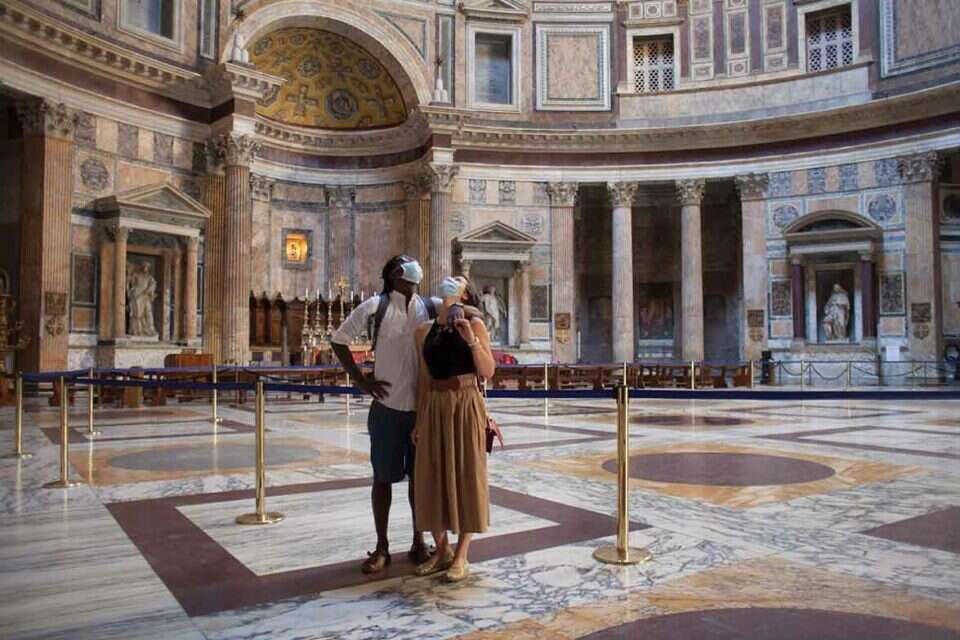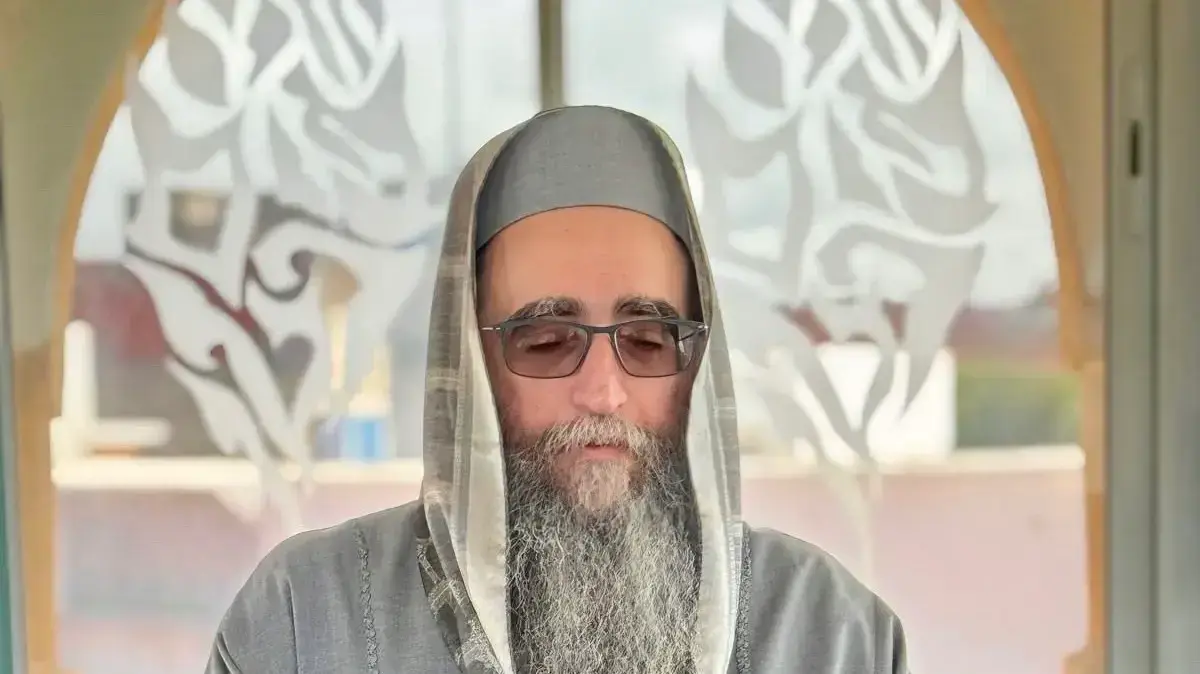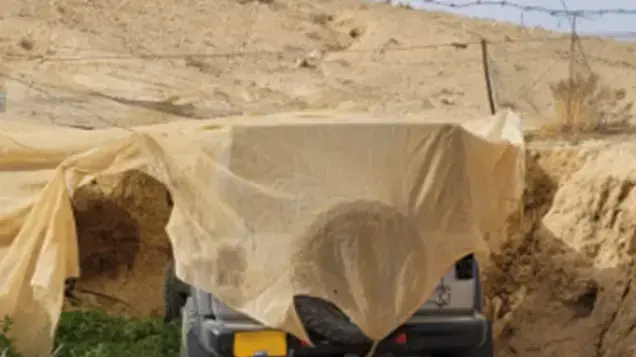I spent the summer in Italy. Two years after the corona virus that struck this country and actually heralded its arrival to the Western world from distant China, and just before the winter that threatens to collapse Europe in the face of the gas sanctions and the war between Russia and Ukraine, I wanted to see this country with my own eyes after two years when most of the world did not leave its borders. And Italy proved what the writer A.M. Forster once wrote about her, "that its people are no less great than the country itself."
Italy waited until last summer to check if we can really say that the tourist routine is back.
So yes, the numbers are back to being high and in the tourist spots in Rome, Florence and the seaside the tourists are back in line - with masks, of course, two meters apart and disinfectant liquid waiting in every corner, as if to remind that nothing is actually over yet.
What we have in Israel sometimes seems like a distant memory, in many parts of Italy it still exists.
Many immigrants and amazing landscapes, photo: Adi Rubinstein
Take, for example, the southern region of the country, often maligned by the north but so beloved by tourists.
Everyone was sure at the bottom of the boot that the tourist celebration would not pass them by, they just forgot that the tourism economy of the region is based mostly on vacationers from Russia.
The residents of these areas couldn't believe that bad luck was catching up with them again, just after the Corona virus.
"Although seven planes a day are landing from Israel this summer, it's really a lot for you, but it's a comma compared to what Italy is used to," explained all the tourists we met with.
In the rest of Italy they are talking about the minority of Asian tourists, with only a few groups, with double masks as if we are still in March 2020, continuing to trickle in, but certainly not in the flow that characterized the pre-corona era.
The memories are fresh.
Coffins for the dead from Corona, photo: AFP
Maloney's victory surprised no one
Italy returned and did not return to itself.
In her character, nothing is really harmed and she continues to sanctify the "sweet life".
But you have to remember that Italy was united in the 19th century and the social divisions in it, especially between the south and the north, were a precursor to this.
Therefore, the possibility of the state losing its grip on many areas is always on the table.
Corona or a war in Europe, or alternatively another election campaign (the 69th in the last 72 years), do not threaten anyone.
History has taught them to get by with minimal government dependence, so George Maloney's victory was no surprise to anyone.
The combination that you will read about here - of Corona which is still showing its signs, understandable racism in Italian society, a precarious economic situation and above all a terrible fear of winter that no one knows if they will be able to get proper heating for their home - released all the barriers in Italian society that dreams of returning to being the empire it once was, even if This means giving a chance to a head of government that history shows will not really last too long, but at least will provide an answer to the damaged Italian pride in the face of the two terrible years and the consequences for the Italian present.
vaccinate, archive,
A historical game
On March 10, 2020, the Atalanta football team left the city of Bergamo for a match against the Spanish team Valencia as part of the Champions League.
The home field of the Italians was not approved for the European Cup games, and the team had to move the game to the temple of football, the San Siro stadium, the home ground of the Milan and Inter teams in the city of Milan, 60 kilometers away from the beautiful and small Bergamo.
It was a game that was supposed to go down in the team's history: a huge 3:4 victory and a record audience in the stands, which stood at 45,000 local spectators and another 2,500 guests from Spain.
But in practice this game went down in history and not for the professional and happy reasons.
Because he will forever be remembered as "the one who brought the Corona virus to Europe", as "Game Zero" (game number 0), as the first sports event that eventually led to the fact that the following year it would not be possible to admit an audience to any sports stadium around the world.
All the spectators who were at the game in question were infected with Corona.
40,000 fell ill already in the two days after and the rest of the adjuncts later in the week.
The Spaniards, who arrived by international transport, also infected everyone who sat next to them on the plane or train.
120,000 residents lived in Bergamo on the eve of the outbreak of the corona virus, and as of the fall of 2022, 270,000 cases were registered in the city.
This is not an error in calculation: all the residents of the city were infected twice, the great majority of them lost relatives.
As in Israel after wars, in Bergamo everyone knows someone who suffered severely from the corona virus or died as a result of the complications of the disease.
It can be said that while wandering in the city's big mall, the one next to the international airport, the corona virus is still with us.
The news broadcasts, which repeat themselves hourly and echo the Corona data, talk directly about the disease.
Those who come to visit Italy these days and expect the same physical gestures that have characterized the country's inhabitants throughout modern history, will find that these things have passed away, probably never again, at least in the foreseeable future.
The distance between two people talking to each other in the street is more reminiscent of cool Western European countries than this Latin Mediterranean country.
People still behave differently when it comes to meetings in public places, which in Italy has led to a rather revolutionary innovation: Italians are becoming more digital and prefer to perform as many operations as possible on the computer.
In a country where 20 million of its 60 million inhabitants are between the ages of 45 and 70 and so technologically far from the rest of the world (as mentioned, some of the phenomena of the summer are long power outages. During which, by the way, in most cases, there is no telephone answer and no forecast for the return of the electricity), this is in a real revolution.
Longing for nationalism?
Maloney, photo: AFP
An amusing statistic to Israeli ears was published in the local press and showed that Italians are returning more e-mails than before, and have even reduced phone calls and personal meetings.
This is a government success after the last two years the state ran campaigns to switch to payment technologies other than cash.
A mask is not a fasa
But life in Italy is really magic and pasta, a lot of pasta, so one of the funniest conversations was when we were asked if the shipping thing was gaining momentum in Israel as well.
When we talk about the dimensions of the phenomenon and the damages it brings with it in the form of the messengers on the electric bicycles, we understand how far Italy is still from us, but for her it has made history: restaurants that made deliveries for the first time in their 70 years of existence discovered this world and invest their income in developing Effective couriers.
What started as actual blasphemy, when some restaurateurs in the country strongly opposed it despite the corona virus, is slowly becoming a standard in Italy's big cities, and they too are experiencing firsthand the phenomenon of electric devices racing on the sidewalks.
And in Italy, although a big believer in the quality of the environment is not ready to give up cars, the phenomenon of electric scooters in general was the initiative of the government.
Just before the corona, the state offered 500 euros in the big cities to buy a bicycle or an electric scooter to abandon the cars and motorcycles.
At first the response was weak, but when the corona broke out and people were afraid to travel by public transport, the scooters experienced a boom.
Italy of yesteryear, photo: Adi Rubinstein
So everyone supposedly moved on, but there is not a salesperson in the mall who is not armed with a standard mask, one that only the government recommends.
Even if you are a bus driver (in Italy it is still forbidden to sit behind the driver and he is surrounded by a rope, as in Israel at the beginning), a librarian or a clerk in a clothing store - everyone is required to wear masks.
In public transport, tourists are also obliged by this, and no, they incur a fine or get off the train.
The signs asking you to keep a distance of two meters are still here, and the old men in Bergamo rarely leave the house and will almost stop when winter comes.
When you cross the highway overlooking the city, you understand very well that what started here may not end in our lifetime.
Even if the corona virus turns into another disease, it will continue to inflict its terror on the people of Italy in the coming years.
So many young people lost their lives, it will take time to forget what happened here.
And the recurring questions in the local media deal with only one issue: what will happen in the winter?
Between cold and heat, between bad and good
Indeed, "winter" is the key word in Italy and throughout Europe.
On trips between the villages, even though it is a day when the temperature reaches 40 degrees in the shade all over the country, old men are standing and trimming trees.
In the "Corriere della Sera", the most common newspaper in Italy, they talk about the fact that if Germany is in big trouble for the approaching winter, what will the Italians say with the faltering economy.
The fact that so many have lost faith in their country is, as mentioned, also related to the historical background.
Italy was divided and everyone lived their lives and spoke their own Italian.
Dependence on the central government was minimal, therefore to this day electricity, water and what grows in the backyard of the farmers and the residents of the periphery satisfies them and removes worry from their hearts.
After all, this is how they lived their whole lives.
After the Corona, it seems that the current generation of Italians already believes that they will be able to overcome everything.
Italy, photo: Adi Rubinstein
But there is a more critical reason to fear the cold season.
Last summer, every day, the water and electricity were proactively cut off by the state, in order to save and reduce expenses for the threatening winter.
Most of the times, the water cut lasted a whole day, but if the water company ran into irregularities, for example filling private pools or watering large gardens unnecessarily, it could last even more than one day, as a punishment for the residents' disobedience.
The climate danger in Italy is clear and immediate, and awareness of it is high: everyone recycles using five types of bins everywhere - from private homes to restaurants, and everyone understands that this is a way of life.
The existential fear of the war between Russia and Ukraine is real, and the lack of gas will lead to Italy facing a wave of deaths this coming winter, for those who will not have enough gas to heat their homes.
But the matter of the climate is much more significant because most Italians, especially the young, understand that unlike the war, which is a passing matter, the next Italian summers will become as unbearable as the last summer that passed them.
It seems that one summer of high temperatures was enough for them to change their entire world view, and maybe finally most of them will install air conditioners and connect to modernization.
Fighting for the local DNA
The fact that the Italians faced the corona and were able to handle it returned them to engage in the usual matters related to the pleasures of life and their economic perspective.
For example, Francesco, in whose modest house in the Italian Riviera we stayed, asked us, "What do they have in the north that they need so much money? When will they have time to spend it?"
On one side of us is the city of Genoa and on the other side "Cinco Terra", that tiredly touristed area where all the languages of the world get confused in August, as if there was no corona in our lives.
"Maybe when they complete the construction of the train from Milan to Genoa, the people from there will be able to live by the sea and realize that their pursuit is crazy, they live there under terrible stress," says Francesco.
He drives a Fiat 5 and has the joy of life of a 5-year-old. He is angry with the municipality for not renovating the streets, because then it would be possible to live here in peace with the amount of tourists in the summer months.
"On the other hand, we don't want to be Americans, we don't need too much."
What is not too much?
Francesco asks that we take a bus and not go around in taxis in the city, because it's just expensive and costs "5 euros".
Genoa (or Genova according to the locals) was once the highlight of Italian seafaring.
Its nickname, "The Proud", somewhat tells the story of the city where Christopher Columbus was born, from where the boy Marco set out to look for his mother in the mythological work "The Heart", and where the first professional soccer team in Italy was also founded.
But today Genoa faces the usual problems of a port city that has declined from its greatness: it is rough and full of immigrants due to its geographical location, livelihood is difficult, crime is high - and the scenery, as always, remains stunning.
When we arrived in the city at the beginning of August, Italy was still shaken by what had happened at the end of the previous month: a Nigerian peddler was murdered in front of dozens of Italians when he was beaten to death in the middle of the town of Chibitanova, a coastal town with a large Nigerian community that often suffers from racism.
The murder was filmed by passers-by who not only refrained from helping the unfortunate murdered, they also did not hide their indifference and maybe even their joy for Id.
The hawker was strangled to death in front of the cameras, and apart from a few shouts of "stop" towards the attacker, no one dared or wanted to intervene.
The media and politicians in Italy expressed shock, but they also expressed the same shock in 2018 when a shooting spree took place in the city that ended in the murder of six Africans, in what was then defined as a hate crime.
The elections held last month in the country were marked by Italy's immigrant problem.
But in this you can't really come to her with claims or think that she is unique.
In post-Corona Europe, there is no country where immigrants are not the main issue of the election campaigns.
Racism is everywhere, hidden and overt, and every week black and non-black football stars testify to what is happening on the local football fields.
And not only them, and not only in Italy.
But Italy is too proud a country for all these events to prevent it from living life, always choosing to see what can be bought with the 1,682 dollars which is the average monthly salary and drinking the wine at noon in a calm and relaxed atmosphere.
Yes, the prices for the Israeli tourist are ridiculous and meals throughout Italy in central places such as Florence, Milan, Rome, Naples and even the tourist areas are sold at relatively low prices.
The economy is struggling to recover, but for the average Italian this does not mean that he will not continue to eat out three times a day and try to live life as it was before the corona, which claimed the lives of 176 thousand people and continues to claim an average of 100 people a day.
The long journey in Italy shows that the corona only strengthened what was already known before.
The struggle between the south and the north meant that the country will receive the largest financial aid in the European bloc after the corona with the aim of rehabilitating the south and finishing projects in the field of infrastructure, which began to be built before 2020. New projects, by the way, are stopped in these parts of the country for the time being.
Today's Italy is fighting for its local DNA in the face of the multitude of blows it has taken, and is comforted by the collective unconscious that reminds that it was once the greatest empire in the world. If, however, one thing has changed that is noticeable to the eye, even to a visitor who comes to it, it is the minority of kisses and physical gestures that used to be the hallmark of the people here. Less touching, less kissing and less physical closeness. But nothing, no matter how bad, can take away the passion for life and the choice in it. Giorgia Maloney is just the means to try to experience something that Italians understand subconsciously -Awareness of them that has been lost for a long time.
were we wrong
We will fix it!
If you found an error in the article, we would appreciate it if you shared it with us









